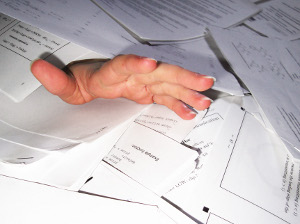 What are the distracting tasks weighing on you today? You know the ones; they keep popping into your head while you’re doing other things and distracting you from the task at hand. They generally cause frustration because you now have to refocus on the task at hand and worry about when you will be able to do that other task. An you might feel a bit buried like the picture.
What are the distracting tasks weighing on you today? You know the ones; they keep popping into your head while you’re doing other things and distracting you from the task at hand. They generally cause frustration because you now have to refocus on the task at hand and worry about when you will be able to do that other task. An you might feel a bit buried like the picture.
What Not To Do
I used to get to a point on the task at hand where I had about ten minutes left and then a five to fifteen minute distracting task would pop into my head so I would switch to that task. This caused two problems: 1) I didn’t write down where I had left off on the first task, so it took twice as long to finish and 2) because I didn’t finish the first task, it was now the distracting task.
Better Options
Get a notebook or a post-it and write down distracting tasks when they pop up. Then go back to the task at hand. When you write it down so you can plan for it later will generally stop that distracting task from popping up again.
If you have a list of tasks for the day you might want to review priorities to see where this new task should be added. If it doesn’t fit with today’s schedule, make sure it gets scheduled another day.
You might find that even after you’ve scheduled time tomorrow or later in the week for the distracting task that it keeps popping up. Well, then you might want to do it today just so you don’t spend the time and energy thinking about it. There is value in freeing up that space and time.
How do you handle distracting tasks?





